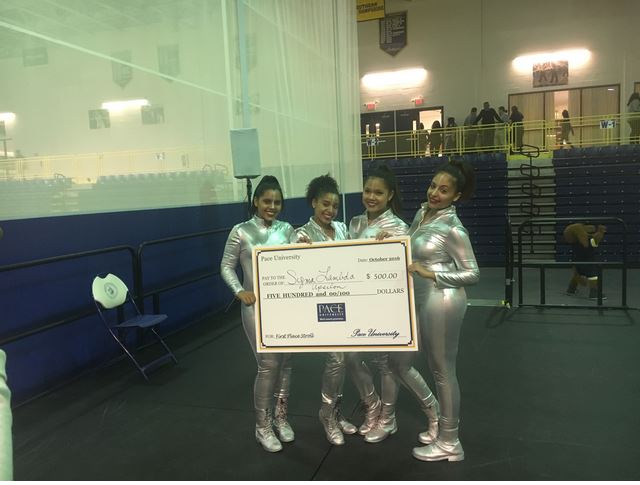Cultural Organizations Boycott Stroll Competition
Sigma Lambda Upsilon’s, Blacklisted national performance team after winning the Stroll Competition
Pi Lambda Phi (PLP) became the first organization from the Interfraternity Council (IFC) to participate in Pace’s annual Step and Stroll competition, causing cultural organizations on campus to forfeit participation.
In past years, only members of NALFO or the National Pan-Hellenic Council (NPHC) have participated strolling competitions, including Sigma Lamba Upsilon’s (SLU) national performance team, Blacklisted.
Blacklisted member Ashley Alahakoon explained the culture behind strolling and why it means more to cultural organizations than “just a competition.”
“We participate here because it is part of our history. We bring it back to African American dancing, that’s why we stroll,” Alahakoon said. “It is a part of our heritage, we don’t do it just to dance. It’s really part of our culture.”
Alahakoon said that there were other organizations that were going to compete in the stroll competition as well but the inclusion of PLP them made them choose not to because they viewed it as “disrespectful.”
“I know there were a couple of organizations that wanted to [participate] but there was a lot of drama that happened,” Alahakoon said. “It’s just a different competition this year, they decided to not do it because [PLP’s inclusion] is a little disrespectful in a way. We work so hard to get to the point of strolling, for other people to just think that they can do it kind of hurts us.”
However, PLP alumnus Edwin Rodriguez said that his organization wanted to start something new and be the first non-cultural organization in the event.
“This year [the organization] came together to agree upon [participating] and it was very challenging to do it because none of us are choreographers, none of us have a lot of dancing experience or background so this was a whole new process for all of us to do,” Rodriguez said.
Rodriguez believes that PLP did a great job and that the event was a learning experience for him and his brothers.
“I can definitely say that it was a lot of work and a time commitment, maybe some other organizations don’t have the numbers to do it because for us it was difficult getting all of our brothers to participate because we weren’t knowledgeable in this and other organizations, I don’t know how much time could be dedicated to something like this. So it’s a lot to do in only two weeks,” Rodriguez said.
Alpha Kappa Alpha, the first historically black sorority, led the act of strolling on college campuses in the early 1900s, according to the J. Thomas Brand Journal of Strolling.
The journal states that the history of strolling goes all the way back to the times of slavery, and that getting in a line and being bonded together physically as a unit is part of the initiation process into the organization. It represents a bond and brother and sisterhood that cannot be broken.
Historically, black Greek organizations would line up one after another and begin to move forward in the same dance motions, or many times alternating dance moves.
Alahakoon believes it’s important for cultural organizations to stroll because the act of strolling represents their culture and history as a minority group.
“We’re an organization based on culture. Everything that we do, our events, our philanthropy, what we stand for is based on certain culture. My culture is Latina, everything I do is based on our struggles and the NPHC is based on African American people and their struggles so strolling comes from that and always draws us back to our roots,” Alahakoon said.
The future of the stroll competition on the Pace campus is unknown at the moment as the number of students in cultural organizations are slowly dwindling down as members graduate.
Your donation supports independent, student-run journalism at Pace University. Support the Pace Chronicle to help cover publishing costs.

